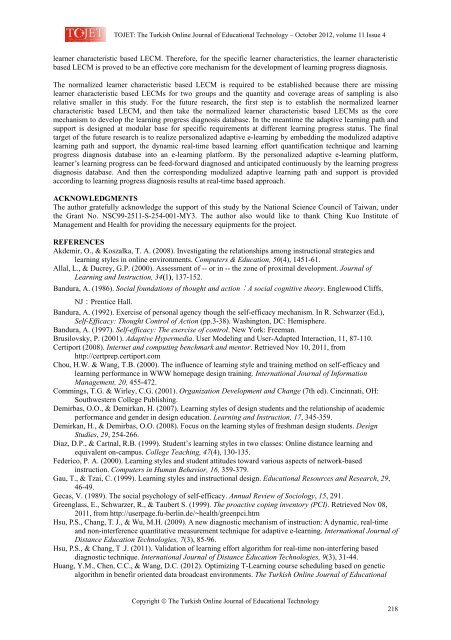october 2012 - TOJET the Turkish online journal of educational ...
october 2012 - TOJET the Turkish online journal of educational ...
october 2012 - TOJET the Turkish online journal of educational ...
You also want an ePaper? Increase the reach of your titles
YUMPU automatically turns print PDFs into web optimized ePapers that Google loves.
<strong>TOJET</strong>: The <strong>Turkish</strong> Online Journal <strong>of</strong> Educational Technology – October <strong>2012</strong>, volume 11 Issue 4<br />
learner characteristic based LECM. Therefore, for <strong>the</strong> specific learner characteristics, <strong>the</strong> learner characteristic<br />
based LECM is proved to be an effective core mechanism for <strong>the</strong> development <strong>of</strong> learning progress diagnosis.<br />
The normalized learner characteristic based LECM is required to be established because <strong>the</strong>re are missing<br />
learner characteristic based LECMs for two groups and <strong>the</strong> quantity and coverage areas <strong>of</strong> sampling is also<br />
relative smaller in this study. For <strong>the</strong> future research, <strong>the</strong> first step is to establish <strong>the</strong> normalized learner<br />
characteristic based LECM, and <strong>the</strong>n take <strong>the</strong> normalized learner characteristic based LECMs as <strong>the</strong> core<br />
mechanism to develop <strong>the</strong> learning progress diagnosis database. In <strong>the</strong> meantime <strong>the</strong> adaptive learning path and<br />
support is designed at modular base for specific requirements at different learning progress status. The final<br />
target <strong>of</strong> <strong>the</strong> future research is to realize personalized adaptive e-learning by embedding <strong>the</strong> modulized adaptive<br />
learning path and support, <strong>the</strong> dynamic real-time based learning effort quantification technique and learning<br />
progress diagnosis database into an e-learning platform. By <strong>the</strong> personalized adaptive e-learning platform,<br />
learner’s learning progress can be feed-forward diagnosed and anticipated continuously by <strong>the</strong> learning progress<br />
diagnosis database. And <strong>the</strong>n <strong>the</strong> corresponding modulized adaptive learning path and support is provided<br />
according to learning progress diagnosis results at real-time based approach.<br />
ACKNOWLEDGMENTS<br />
The author gratefully acknowledge <strong>the</strong> support <strong>of</strong> this study by <strong>the</strong> National Science Council <strong>of</strong> Taiwan, under<br />
<strong>the</strong> Grant No. NSC99-2511-S-254-001-MY3. The author also would like to thank Ching Kuo Institute <strong>of</strong><br />
Management and Health for providing <strong>the</strong> necessary equipments for <strong>the</strong> project.<br />
REFERENCES<br />
Akdemir, O., & Koszalka, T. A. (2008). Investigating <strong>the</strong> relationships among instructional strategies and<br />
learning styles in <strong>online</strong> environments. Computers & Education, 50(4), 1451-61.<br />
Allal, L., & Ducrey, G.P. (2000). Assessment <strong>of</strong> -- or in -- <strong>the</strong> zone <strong>of</strong> proximal development. Journal <strong>of</strong><br />
Learning and Instruction, 34(1), 137-152.<br />
Bandura, A. (1986). Social foundations <strong>of</strong> thought and action‥A social cognitive <strong>the</strong>ory. Englewood Cliffs,<br />
NJ:Prentice Hall.<br />
Bandura, A. (1992). Exercise <strong>of</strong> personal agency though <strong>the</strong> self-efficacy mechanism. In R. Schwarzer (Ed.),<br />
Self-Efficacy: Thought Control <strong>of</strong> Action (pp.3-38). Washington, DC: Hemisphere.<br />
Bandura, A. (1997). Self-efficacy: The exercise <strong>of</strong> control. New York: Freeman.<br />
Brusilovsky, P. (2001). Adaptive Hypermedia. User Modeling and User-Adapted Interaction, 11, 87-110.<br />
Certiport (2008). Internet and computing benchmark and mentor. Retrieved Nov 10, 2011, from<br />
http://certprep.certiport.com<br />
Chou, H.W. & Wang, T.B. (2000). The influence <strong>of</strong> learning style and training method on self-efficacy and<br />
learning performance in WWW homepage design training. International Journal <strong>of</strong> Information<br />
Management, 20, 455-472.<br />
Commings, T.G. & Wirley, C.G. (2001). Organization Development and Change (7th ed). Cincinnati, OH:<br />
Southwestern College Publishing.<br />
Demirbas, O.O., & Demirkan, H. (2007). Learning styles <strong>of</strong> design students and <strong>the</strong> relationship <strong>of</strong> academic<br />
performance and gender in design education. Learning and Instruction, 17, 345-359.<br />
Demirkan, H., & Demirbas, O.O. (2008). Focus on <strong>the</strong> learning styles <strong>of</strong> freshman design students. Design<br />
Studies, 29, 254-266.<br />
Diaz, D.P., & Cartnal, R.B. (1999). Student’s learning styles in two classes: Online distance learning and<br />
equivalent on-campus. College Teaching, 47(4), 130-135.<br />
Federico, P. A. (2000). Learning styles and student attitudes toward various aspects <strong>of</strong> network-based<br />
instruction. Computers in Human Behavior, 16, 359-379.<br />
Gau, T., & Tzai, C. (1999). Learning styles and instructional design. Educational Resources and Research, 29,<br />
46-49.<br />
Gecas, V. (1989). The social psychology <strong>of</strong> self-efficacy. Annual Review <strong>of</strong> Sociology, 15, 291.<br />
Greenglass, E., Schwarzer, R., & Taubert S. (1999). The proactive coping inventory (PCI). Retrieved Nov 08,<br />
2011, from http://userpage.fu-berlin.de/~health/greenpci.htm<br />
Hsu, P.S., Chang, T. J., & Wu, M.H. (2009). A new diagnostic mechanism <strong>of</strong> instruction: A dynamic, real-time<br />
and non-interference quantitative measurement technique for adaptive e-learning. International Journal <strong>of</strong><br />
Distance Education Technologies, 7(3), 85-96.<br />
Hsu, P.S., & Chang, T .J. (2011). Validation <strong>of</strong> learning effort algorithm for real-time non-interfering based<br />
diagnostic technique. International Journal <strong>of</strong> Distance Education Technologies, 9(3), 31-44.<br />
Huang, Y.M., Chen, C.C., & Wang, D.C. (<strong>2012</strong>). Optimizing T-Learning course scheduling based on genetic<br />
algorithm in benefir oriented data broadcast environments. The <strong>Turkish</strong> Online Journal <strong>of</strong> Educational<br />
Copyright © The <strong>Turkish</strong> Online Journal <strong>of</strong> Educational Technology<br />
218
















